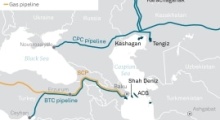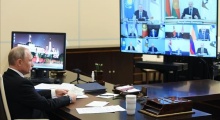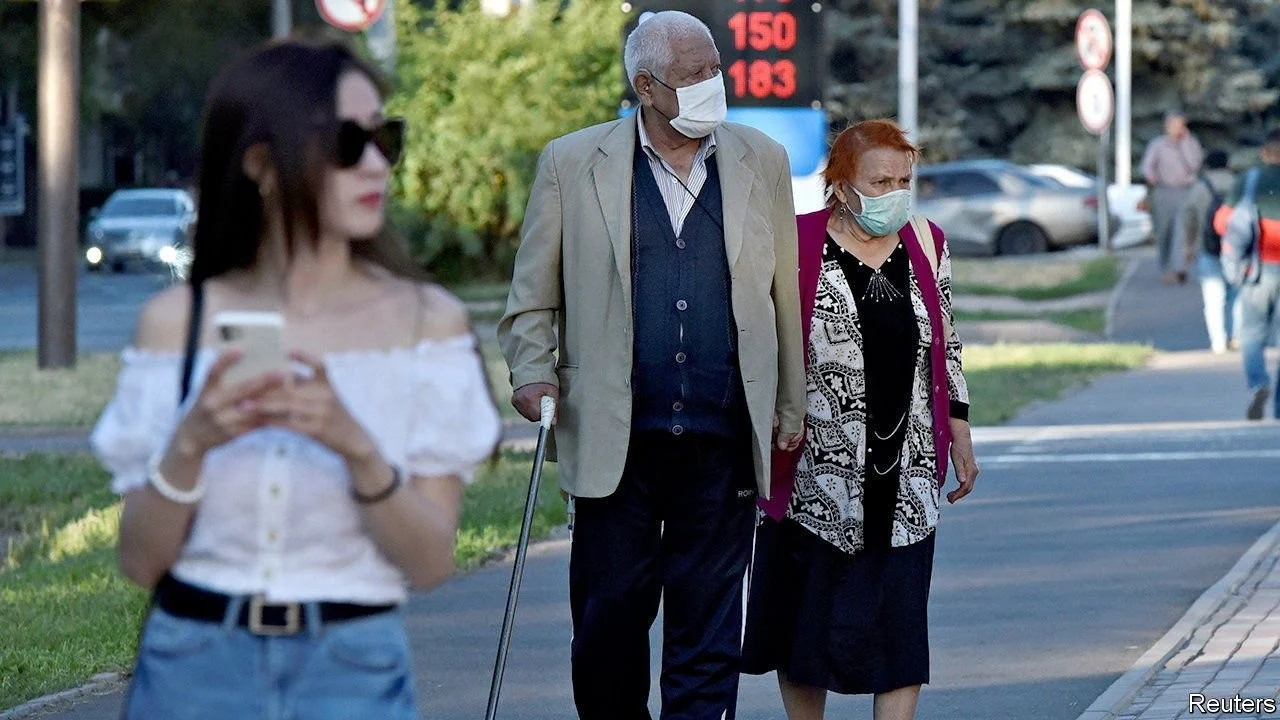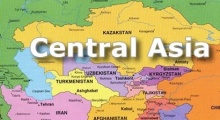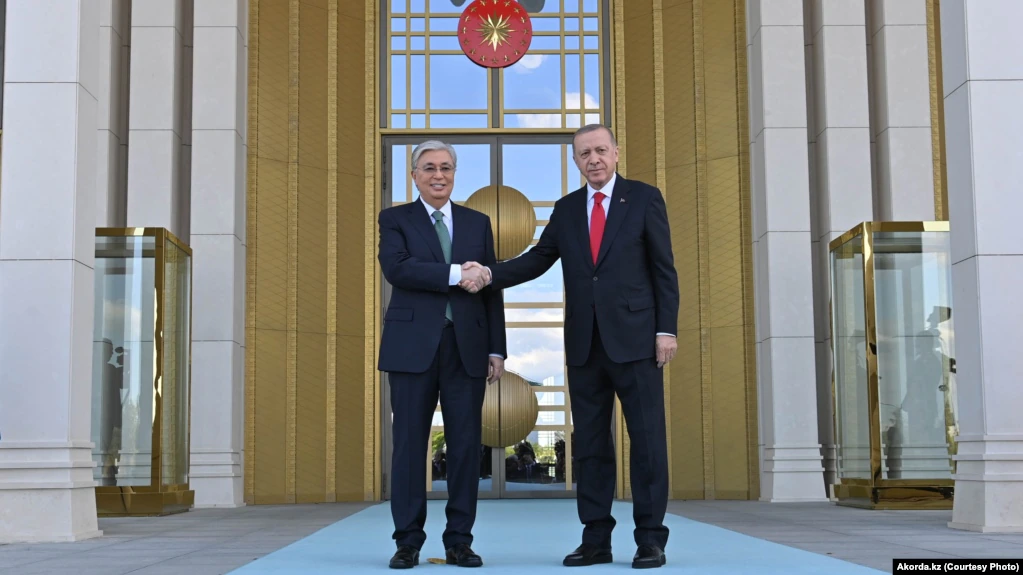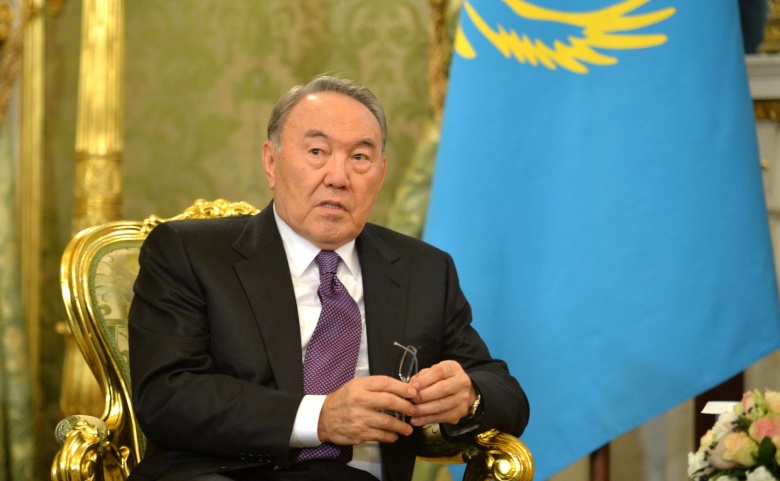
Insider Linked to Payments to Foreign Officials
On a rainy August day last year, an American entrepreneur named James H. Giffen sat in the clubby surroundings of his favorite London hotel, the Dorchester, immersed in an effort to defuse a high-stakes scandal: allegations that millions of dollars from U.S. oil companies had been used to bribe high officials in the Central Asian republic of Kazakhstan.
Seated across from Giffen in the Dorchester lobby was Akezhan Kazhegeldin, a former Kazakh prime minister who had become a subject of a Swiss investigation into disappearing oil payments. A few days earlier, the Swiss probe had taken a startling turn, and was now threatening also to engulf Giffen's boss, Kazakhstan President Nursultan Nazarbayev.
According to the former prime minister's camp, Giffen offered Kazhegeldin a deal. Kazhegeldin would end his outspoken opposition to President Nazarbayev, papering over a serious rift in the Kazakh leadership and putting a lid on the corruption allegations. In return, Kazhegeldin would be protected from prosecution and receive a high-level position back in Kazakhstan, a country four times the size of Texas with some of the most valuable oil reserves in the former Soviet Union.
Soon, however, Giffen himself would become a central character in the scandal. After more than a year of tracking the case, the Swiss justice ministry ordered Swiss banks last month to cooperate with a U.S. Justice Department investigation into allegations that Giffen violated the Foreign Corrupt Practices Act, which prohibits bribery of foreign officials. According to Justice Department documents obtained by The Washington Post, Giffen allegedly orchestrated the transfer of more than $30 million in oil commissions to Nazarbayev and other Kazakh leaders through an intricate network of shell companies registered in the British Virgin Islands and through Liechtenstein-based foundations.
Investigators see the scandal as an example of big business as usual on the rough and risky frontier of capitalism in the former Soviet Union, where personal influence and connections can pay extraordinary dividends. It is a world where Giffen, a 60-year-old oil consultant based in New York, has flourished. During the decade since the collapse of communism, Giffen has performed a wide variety of services on behalf of Nazarbayev, arranging presidential trips to the United States, sealing multi-billion dollar oil deals and becoming an indispensable intermediary for U.S. companies seeking to do business with the Kazakh government.
The Justice Department's investigation could also have important implications for U.S. policy in a strategically sensitive part of the world. After eight years of treating Nazarbayev as a highly valued ally, the Clinton administration--or at any rate one part of it--is now casting him in quite a different light, which could lead him to distance himself from Washington.
Kazakh officials have reacted with a mixture of indignation and embarrassment to the Giffen case, which began attracting public attention in July following the leaking of a Justice Department memorandum formally requesting Swiss government assistance. In an interview earlier this month, Kazakh Foreign Minister Erlan Idrissov said Giffen retained the "full confidence" of the Kazakh government. "Everything was done in an absolutely transparent, lawful and acceptable manner," he said.
In recent weeks, the Justice Department has been reviewing cartons of documents supplied by oil companies linked to the suspicious transactions: BP Amoco PLC, Exxon Mobil Corp. and Phillips Petroleum Co. An Exxon Mobil spokesman said the company was cooperating with the U.S. attorney's office in Washington on "an ongoing grand jury investigation." Spokesmen for all three oil companies denied wrongdoing.
No formal charges have been made against Giffen. While Giffen declined to be interviewed for this story, his Washington law firm, Akin, Gump, Strauss, Hauer & Feld, described allegations of misconduct against their client as "without substance" and said Giffen had been operating under the direction of the Kazakh government.
Even before the deals that attracted the scrutiny of investigators, Giffen, a clothier's son from California, had become rich through his association with Kazakhstan. Millions of dollars in commissions on Kazakh oil deals helped provide such luxuries as an 11-acre estate by the celebrated Winged Foot golf course in New York's Westchester County, a Bentley, parties at the 21 Club in New York, and trips to Switzerland and the Bahamas with Nazarbayev.
Giffen's alleged attempt to broker an agreement at the Dorchester Hotel last year with Nazarbayev's rival, Kazhegeldin, did not produce a reconciliation. Instead, according to sources close to Kazhegeldin, the former prime minister rejected a five-point settlement proposed by Giffen, asking him: "What gives you the right to move figures around the chessboard?"
The Giffen camp disputes this version of events, describing it as "not correct" but declining to provide further details. Giffen's lawyer, Mark MacDougall, said his client would have "nothing more to say in response to this latest tale of intrigue."
'Mr. Kazakhstan'
When the Soviet Union disintegrated in December 1991, leaving 15 newly independent countries including Kazakhstan, Giffen was exceptionally well placed to operate within the free-wheeling environment. He had traveled to the Soviet Union as a trade consultant for more than two decades, getting to know many leading politicians, including Soviet leader Mikhail Gorbachev and Nazarbayev, Kazakhstan's last Communist Party boss.
Handsome, supremely confident and always superbly dressed, Giffen cut a swath through Moscow. He was also the subject of some controversy among fellow members of the Western business community. While serving in 1984 as president of the U.S.-U.S.S.R. Trade and Economic Council--an administrative post representing all U.S. firms--he established a private banking corporation, Mercator, with a client list that included Chevron Corp. and Archer Daniels Midland Co.
"There was a direct conflict of interest that caused a lot of confusion and anxiety among other members of the council," said Leo Welt, who represented competing companies such as Halliburton Co., Amoco and International Harvester. "How can you run a nonpartisan trade council and have access to all the projects coming down the pike, and also have your own consulting company?"
Friends and detractors alike say that Giffen, who was once married to the granddaughter of Harry Hopkins, president Franklin D. Roosevelt's close adviser, has seen a bigger role for himself on the international stage than simply cutting business deals.
"He really believes in the idea of proselytizing Western political values in the former Soviet Union," said Mark Siegel, a former Democratic Party vice chairman who has worked with Giffen as a paid political consultant to the Kazakh government. "It is almost a religion for him."
Giffen's first big business venture in Kazakhstan involved a $20 billion deal negotiated by Chevron Corp. for a 50 percent stake in the huge Tengiz oil field in western Kazakhstan. The extent of Giffen's contribution to the deal is disputed. When he tried to get involved in negotiations in December 1991, Chevron sent him a letter saying "you and your staff are not required." Nevertheless, informed sources said that Chevron agreed to pay Giffen an undisclosed "success fee" believed to be about 7.5 cents for every barrel it pumped from the Tengiz field, a commission worth millions of dollars.
Neither side would talk on the record about Giffen's role in the Chevron deal, citing a confidentiality agreement.
In the meantime, Giffen was consolidating his position as a trusted adviser to Nazarbayev. According to U.S. officials, he helped set up Nazarbayev's first presidential visit to Washington in May 1992, when he met with President George Bush. His company, Mercator, took charge of many arrangements for the visit, from making appointments to paying bills. Such was Giffen's pull that he began traveling to and from Kazakhstan on a Kazakh diplomatic passport, even though he remained a U.S. citizen.
"Giffen played a very useful role given the fact that the Kazakh government was less than a year old and didn't have an embassy or ambassador in Washington," said Edward C. Chow, an international oil consultant who was working in Chevron's Washington office at the time. Chow remembers that at Blair House, the official guest residence across from the White House where Nazarbayev stayed, "Mercator people answered the phone."
According to U.S. officials, Giffen presented himself to Nazarbayev and others as being uniquely positioned to open doors in Washington, with a special relationship with Vice President Gore, who chaired a U.S.-Kazakhstan joint commission. Former Kazakh prime minister Kazhegeldin said Giffen "succeeded in creating the illusion in Nazarbayev's mind that the American government supported Nazarbayev completely."
To Americans seeking to cut deals with the Nazarbayev government, Giffen was viewed as "Mr. Kazakhstan," a man who could cut through red tape at the highest levels. "He seemed to have a stranglehold on almost all oil and gas contracts," recalled a State Department official.
U.S. officials dealing with Kazakhstan had a mixed view of Giffen's influence. On one hand, they recognized that he could promote U.S. economic interests in a sensitive part of the world. But they were concerned that he favored some U.S. companies over others for reasons that were unclear.
According to a knowledgeable source, U.S. Ambassador to Kazakhstan William Courtney urged Giffen to disclose his activities as a paid consultant to the Kazakh government. Under a law originally introduced to keep track of Nazi agents in the United States, anyone who "represents the interests of a foreign principal" in the United States is required to register with the Justice Department. Giffen refused to take Courtney's advice, according to the source, and he has never registered.
Courtney's successor, Elizabeth Jones, expressed misgivings about Giffen's role as the gatekeeper to the Kazakh government in two cables to her superiors in Washington, according to State Department sources. There appears to have been no follow-up to the cables, which were largely designed to get the ambassador's reservations about Giffen "into the system," the sources added.
A Web of Money
By all accounts, Kazakhstan's system of public finances was a mess long after the country became independent in December 1991. According to Kazhegeldin, the Kazakhstan treasury did not even have its own foreign bank accounts until 1996. Corruption and capital flight have drained the state treasury, leading to a situation in which the offshore banking havens of Bermuda and the British Virgin Islands are now ranked as Kazakhstan's largest trading partners behind Russia.
Documents inspected by The Post show that the country's leaders established a bewildering variety of foreign bank accounts to store the proceeds of business deals involving the sale of raw materials and the development of the Kazakh oil industry. Some accounts were in the name of the government; others were set up in the name of foundations that allegedly benefited Kazakh politicians and their families.
According to foreign law enforcement sources, Swiss investigating magistrate Daniel Devaud examined between 50 and 60 accounts in at least four different banks: Credit Agricole Indosuez, Credit Suisse, Pictet and United European Bank. Many of the most controversial transactions went through Credit Agricole Indosuez, an affiliate of the French bank Credit Agricole.
Ironically, Devaud's investigation was triggered by the Kazakh government itself, which alerted Interpol to allegations of corruption by Kazhegeldin. Investigators were eventually led to bank accounts in Switzerland controlled by various Kazakh officials. As he researched the complaint, Devaud discovered $100 million in transfers from oil companies to escrow accounts at Credit Agricole, and the routing of about a third of those funds to accounts benefiting senior Kazakh officials, including Nazarbayev. Devaud alerted the Justice Department to his findings in January.
An Aug. 17 letter from the Justice Department to the Swiss police, which identifies "Giffen and others" as subjects of the investigation, singles out as "highly suspicious" three big oil deals involving payments from Amoco, Phillips Petroleum and a consortium of oil companies that included Mobil between May 1997 and September 1998. In each case, the money was allegedly channeled through a pyramid of escrow accounts and shell companies to the Liechtenstein-based foundations of Kazakh officials and their families.
All three oil deals being investigated by the Justice Department involved payment of large sums--up to $12 million--to the account of Orel Capital Ltd., identified by the Justice Department as a shell company ultimately benefiting Nazarbayev. According to Swiss court documents, the Orel Capital account grew to around $84 million by August 1999. After Swiss magistrates launched a money laundering investigation, nearly this entire amount was then transferred to an official Kazakh government account at Pictet.
Earlier this summer, a Swiss magistrate lifted an order freezing the Pictet account after finding that the $84 million had returned to "the sphere of Kazakh authority." But those funds, and the funds in the Credit Agricole accounts, remain frozen at the request of the Justice Department.
Other beneficiaries of oil company commissions listed by the Justice Department included Liechtenstein-based foundations allegedly set up on behalf of former oil minister Nurlan Balgimbayev and his daughter. Balgimbayev, who now heads the state-run oil company Kazakhoil, told reporters last July that he was "clean."
According to the Justice Department letter, there was a single payment of $6 million to an account benefiting the family of former prime minister Kazhegeldin in August 1997. Kazhegeldin's Washington lawyer, Charles R. Both, described the payment as an attempt to "compromise" his client and "implicate him in the corruption that occurred prior to that time and subsequently."
The precise role played by Giffen and Mercator in handling these transactions is unclear. The Justice Department letter says Giffen "ultimately transferred" tens of millions of dollars to the accounts of shell companies registered in the British Virgin Islands, but does not say whether he acted by himself or through an intermediary.
Mark MacDougall, of Akin Gump, said the oil contracts were "structured in a transparent manner, consistent with international standards" and "negotiated by some of the most prominent law and accounting firms in the United States."
According to his lawyer, Giffen managed the accounts in Geneva together with "other Kazakh officials at the direction of the government for public purposes. Disbursements were primarily made to accountants, lawyers and other professionals for work associated with Caspian natural resource development, as well as programs to promote democratization and development of public infrastructure." The rest of the money remained at Credit Agricole, and is subject to "a full accounting."
From the bank's standpoint, though, the accounting was anything but complete. According to knowledgeable sources, the account manager, Jean-Jacques Bovey, allegedly received millions of dollars in unreported commissions in exchange for his services to the account holders. Bovey left the bank about nine months ago.
Maurice Harari, Bovey's lawyer, declined to comment on the allegation of unauthorized payments, but said that, as far as he knows, his client is not under criminal investigation. He added that the oil contracts were approved by the bank's board.
Even if prosecutors can prove that large amounts of oil money ended up in accounts benefiting senior Kazakh officials, it may be difficult to demonstrate whether the companies knew, or could have had reason to suspect, that the payments would end up in the hands of shell companies rather than official Kazakh government accounts.
Spokesmen for all three U.S. oil companies--Amoco has since merged with British Petroleum to form BP Amoco, and Mobil has become a subsidiary of Exxon Mobil--insist that the companies acted under the instructions of the Kazakh government.
A BP Amoco spokesman, Youssef Ibrahim, said it was "Amoco's belief" that the oil commissions were being paid to the Kazakh government. A spokeswoman for Phillips Petroleum, Kristi DesJarlais, said the company had "no knowledge" of what happened to the payments after they left the escrow account. Exxon Mobil spokesman Tom Cirigliano said "no payments were made to individual Kazakh government officials or their relatives" in connection with the oil deals. U.S. officials concede that any case against the oil companies rests on complicated and untested areas of law. All the same, said Justice Department spokesman John Russell, "we contend that they are responsible for knowing how the money is spent."
As for Giffen, Kazakh officials believe he is covered by the principle of "sovereign immunity," which entitles independent countries to run their legal and financial affairs as they wish. Giffen, their argument goes, was acting under orders from the Kazakh government, and therefore not subject to the U.S. Foreign Corrupt Practices Act. Kazakhstan's ambassador to Washington, Bolat Nurgaliyev, said that no Kazakh laws were broken in moving the money through the network of banks, shell companies and foundations.
"We don't need to explain to anybody why we were doing this," he said.
Original source: By Michael Dobbs, David Ottaway and Sharon LaFraniere
Washington Post Staff Writers
Monday, September 25, 2000; Page A01


